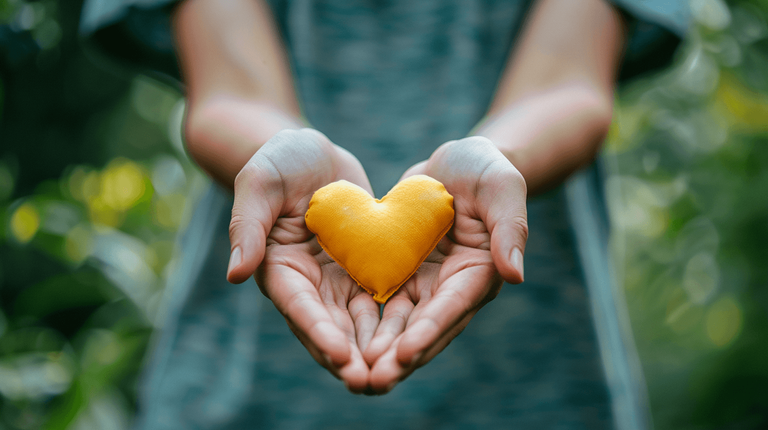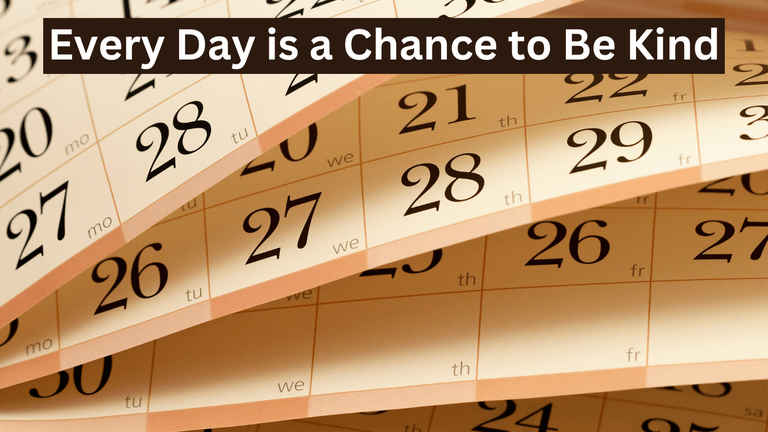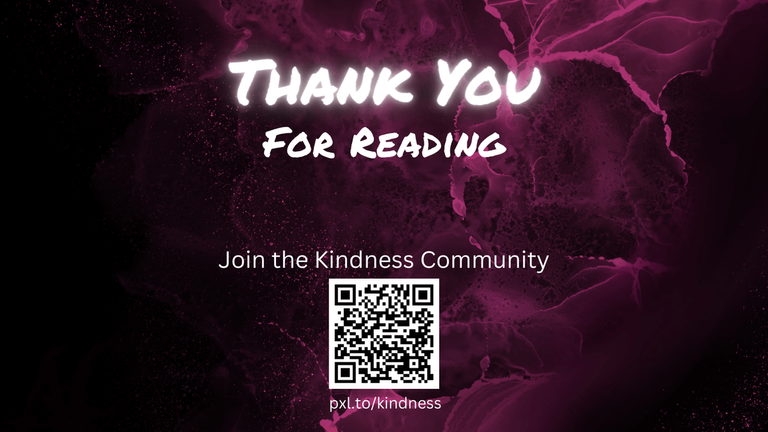Kindness, Anxiety, Depression, and Mental Health

In a world that is all too often about me, me, me, choosing kindness offers a refreshing alternative. It is no surprise to me that science shows prioritizing others benefits our mental and emotional health. In this post, we'll explore why kindness is not just a nice trait but a vital element for a happier, healthier life. As someone who has battled anxiety and depression for years, I can attest to the transformative power of kindness on mental health. In some of my darkest moments, a simple kind gesture from strangers has given me the strength and courage to continue on. I firmly believe that a kind word has the potential to save a life.
What Is Kindness and Why Does It Matter?

Being kind is more than just being polite or having good manners. Real kindness is about caring for others, wanting to help, and taking action. Kindness is like a superpower that benefits all of us! It makes us feel good and improves our mental health. It helps us connect with others and makes the world a better place.
Different Forms of Kindness

When it comes to kindness, there are different ways we can express it. It can be directed towards ourselves, others, or the world around us. Here's a breakdown:
Kindness Towards Ourselves: Treating ourselves with understanding and care, just like we would for a best friend. This involves forgiving our mistakes, celebrating our strengths, and taking care of our minds and bodies.
Kindness Towards Others: This is the more commonly thought of kindness. It includes actions like helping a friend in need, complimenting a stranger, or supporting causes that are important to us.
Kindness Towards the World Around Us: Showing care and respect for our planet and all living beings. Simple gestures such as recycling, cleaning up litter, or being compassionate towards animals contribute to this form of kindness.
Integrating different types of kindness into daily life can create a positive impact for us, others, and the world at large.
How Kindness Benefits Mental Health

Kindness has been found to have positive effects on our mental well-being, acting as a form of brain medicine that enhances our overall health and happiness. Scientists have uncovered the impact of kindness on the brain, revealing a variety of physiological effects that contribute to improved mental health:
Hormones Release: Engaging in acts of kindness triggers the release of feel-good chemicals such as dopamine, serotonin, and oxytocin. These neurotransmitters play a crucial role in promoting feelings of happiness, calmness, and reducing stress levels.
Empathy and Connection:
Kindness also stimulates the regions of the brain associated with empathy and social connection. By understanding and connecting with others on a deeper level, we strengthen our relationships, elevate our mood, and foster a sense of belonging.
In essence, practicing kindness not only benefits others but also serves as a powerful tool for enhancing our own mental well-being.
The Power of Kindness in Reducing Anxiety

Kindness plays a significant role in alleviating social anxiety by fostering positive social interactions and reducing nervousness. When we extend kindness towards others, it enhances our comfort levels and gradually diminishes feelings of anxiety.
Kindness and Social Anxiety: Engaging in acts of kindness can mitigate the fear and nervousness experienced in social situations, known as social anxiety. By being kind, we create more positive interactions, leading to increased comfort and reduced anxiety over time.
Shifting the Focus: Anxieties often stem from excessive self-worry. Performing acts of kindness redirects our focus outward, towards helping others. This shift enables us to divert our attention from our own worries, making them seem less overwhelming.
Boosting Confidence: Each act of kindness reinforces the belief that we are compassionate individuals who care for others. This positive self-affirmation helps in building self-confidence. With increased confidence, daunting situations become less intimidating.
Being kind not only benefits others but also contributes significantly to our own well-being by reducing anxiety and enhancing confidence levels.
Kindness as a Tool to Combat Depression

Research has highlighted a strong link between kindness and alleviating symptoms of depression. When people experiencing depression engage in acts of kindness, they often feel a reduction in symptoms such as sadness, increased energy levels, and a more positive outlook.
Breaking Negative Thought Patterns

Depression frequently traps us in negative thought cycles about ourselves, our surroundings, and the future. Acts of kindness can disrupt this cycle by reminding us of our value and shifting our focus towards the positive aspects of life.
How Kindness Aids in Depression Recovery

Purpose and Motivation: Being kind provides us with a sense of purpose and motivation that helps us get through the day.
Positive Reinforcement: Helping others often results in gratitude, reinforcing our feelings of worthiness and capability that contrast the messages of depression.
Social Connection: Kindness involves reaching out to others, combating feelings of isolation and aiding in building our supportive relationships.
It's important to note that while kindness can be beneficial in managing depression, it's not a substitute for professional treatment. If we're struggling, it's important to seek help from a trusted mental health professional.
Being Kind for Improved Self-Esteem

Self-esteem is our inner perception of self-worth and capabilities. When we display kindness, we reinforce positive self-affirmations, reminding ourselves that we are caring people. This leads to a heightened sense of purpose and value, boosting our self-esteem naturally. Here's how it all comes together:
Kind Acts: Engage in acts of kindness such as volunteering, assisting a neighbor, or sharing a smile with a stranger.
Good Feelings: Experience an internal sense of joy and fulfillment from our kind actions.
Positive Self-Talk: Recognize the goodness of our deeds, reinforcing the belief that we are a compassionate person.
Boosted Self-Esteem: With repeated acts of kindness, our self-esteem grows stronger, fostering greater confidence and positivity within us.
In practicing kindness, we not only benefit others but also nurture our own self-esteem and well-being.
Kindness and Sense of Control

Life can often present challenges that leave us feeling powerless and overwhelmed. In these moments, practicing kindness can play a crucial role in regaining a sense of control over our lives. Here's how it works:
Feeling Out of Control: Life's unexpected twists and turns can create stress and frustration, making us feel like we lack control.
Agency Through Helping: When we encounter someone in need, we are faced with a choice - to either ignore the situation or to offer our help. By choosing to take action, even in small ways, we assert our agency and recognize our ability to impact the world around us.
The Power of Action: Despite facing daunting challenges, simple actions aimed at making a difference can be incredibly empowering. By shifting our focus from what we cannot control to what we can, we regain a sense of control in our lives.
In times when negativity and bad news seem overwhelming, engaging in acts of kindness such as donating to a charity or volunteering can serve as a reminder that we hold the power to be part of the solution, even on a modest scale. These actions not only benefit others but also empower us to take charge of our own lives once again.
How Kindness Can Improve Our Happiness

In this post, we've explored the transformative power of kindness on our mental well-being and overall happiness. Let's review the incredible advantages it offers:
Enhanced Mood: Kindness releases chemicals in our brains that uplift our spirits and reduce stress levels.
Stronger Relationships: Acts of kindness foster connections with others, diminishing feelings of isolation and increasing our sense of support.
Reduction of Anxiety and Depression: Engaging in acts of kindness can ease anxiety and help alleviate symptoms of depression.
Increased Confidence: Being kind reaffirms our self-perception as a compassionate and capable person.
Empowerment: Kindness empowers us by giving us a sense of agency, enabling us to believe that we can effect change, even in challenging times.
By incorporating kindness into our daily lives, we can cultivate a happier and more fulfilling existence.
Kindness is a Action

The most important thing to remember is that kindness is like a muscle – the more we use it, the stronger it becomes. We cultivate kindness both for the benefit of others and for our own well-being. So, go out there and start spreading kindness – your brain, your heart, and the world around you will thank you!
A Guide to Being Kind Everyday

To harness the incredible impact of kindness, it's time to take action! Starting small is key as even the tiniest gestures can create significant change. Here are some simple ideas to get you started:
Kindness for Yourself
- Say three positive affirmations in front of a mirror.
- Take a moment to engage in an activity you enjoy.
- Practice self-forgiveness for any past errors.
Kindness for Others
- Offer a warm smile and greeting to strangers.
- Give a sincere compliment to a friend or colleague.
- Leave an uplifting note on a public board or a person's vehicle.
- Extend help to someone struggling with a task or carrying a heavy load.
Kindness for the World
- Dispose of litter you come across.
- Donate gently used items or clothing to those in need.
- Plant a tree or flower to contribute positively to the environment.
The Ripple Effect

Kindness has a beautiful way of spreading! Notice how these acts of kindness not only impact others but also bring joy to us. Our kindness serves as inspiration for further acts of kindness, creating a chain reaction of goodwill.
Incorporating Kindness Into Our Lives

Start with Intention: Begin each day by setting an intention to be kind. This simple practice primes our mind to seek out opportunities to assist others.
Keep it Small: Remember, even the smallest acts of kindness hold significance. Look out for moments where a smile, a helping hand, or a listening ear can make a difference.
Make Kindness a Challenge: Turn kindness into an enjoyable challenge by aiming to complete at least three acts of kindness daily.
Focus on Connection: When engaging with others, strive to truly connect. Maintain eye contact, use their name, and provide your undivided attention. Making someone feel seen is an act of kindness in itself.
Reflect: At day's end, reflect on your kind deeds. Acknowledge the impact they had on you and how they may have brightened someone else's day. Remember, kindness is a skill that improves with practice. Embrace both the challenges and rewards, knowing that the positive effects will grow for both our mental well-being and the world we inhabit.

Images created using MidJourney & Canva, I have commercial licenses.
#kindness #cwh #ecency #education #pob #hivekindness #kindnesschallenge #kindnessmatters #wellness